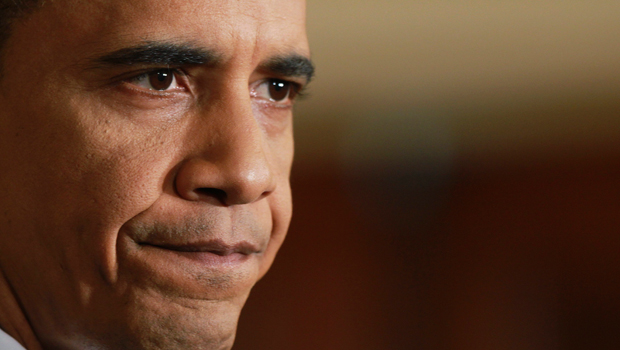After reviewing an Interior Department report into the massive oil spill, Obama outlined four steps to prevent such an accident from happening again including suspending 33 deepwater exploratory wells being drilled in the Gulf.
“If nothing else, this disaster should serve as a wake-up call,” the US president told a press conference, as official data showed the five-week-old spill was now the worst in US history.
The government was extending an existing moratorium on deepwater drilling as well as suspending the issuing of new permits for six months, Obama said, as expert data said the oil was gushing at up to four times previous estimates.
Planned exploration in two locations off the coast of Alaska was suspended, and “we will cancel the pending lease sale in the Gulf of Mexico and the proposed lease sale off the coast of Virginia.”
Obama added, “We will suspend action on 33 deepwater exploratory wells currently being drilled in the Gulf of Mexico.”
He was speaking as BP’s risky “top kill” of the ruptured Deepwater Horizon well, which exploded on April 20 and then sank, appeared to stop the oil flow Thursday.
Coast Guard chief Thad Allen, who is coordinating the US government’s battle against spill, said the “top kill” maneuver begun on Wednesday by BP to plug the leak had stopped the gush of oil from the mile-deep well.
But he cautioned it was still too early to declare victory as the British energy giant pumps heavy drilling liquids, dubbed mud, into the fractured wellhead to beat back the flow of oil, before sealing it with concrete.
Unveiling new data, government scientists said the oil had been gushing from the burst pipe at a rate of between 12,000 and 19,000 barrels a day — much higher than the initial estimate of 5,000 barrels a day.
Under such a scenario, that would mean that between 18.6 million gallons to 29.5 million gallons of oil have seeped into the Gulf. Obama said the disaster showed the need to develop renewable energy sources, but dismissed charges the government had acted too slowly in the crisis.
“The United States government has always been in charge of making sure that the response is appropriate,” Obama said 37 days after the blowout at the BP-leased Deepwater Horizon well.
“This notion that somehow the federal government is sitting on the sidelines and for the last three or four or five weeks we’ve just been letting BP make a whole bunch of decisions is simply not true,” he said.
“This entire White House and this entire federal government has been singularly focused on how do we stop the leak and how do we prevent and mitigate the damage to our coastlines,” he said.
But the US president said that “more than anything else this economic and environmental tragedy, and it’s a tragedy, underscores the urgent need for this nation to develop clean renewable sources of energy.” He added it was time to move forward on legislation to promote renewable energy sources.
“It’s time to accelerate the competition with countries like China who have already realized the future lies in renewable energy and it’s time to seize that future ourselves.”
Meanwhile, BP said on Thursday it was making progress with its "top kill" effort to plug its ruptured Gulf of Mexico oil well.
BP Managing Director Robert Dudley said the company's “top kill” operation to try to plug the well, which started on Wednesday, was “moving the way we want it to.” But he told NBC's "Today Show" it was too early to say whether it had been successful.
In the previous worst US oil spill, in March 1989, the tanker Exxon Valdez hit an undersea reef in Prince William Sound, Alaska, spilling a total of about 260,000 barrels (10.92 million gallons/41.34 million liters) of oil into the sea.
The head of the Minerals Management Service federal agency that oversees US offshore oil drilling has resigned, US Interior Secretary Ken Salazar said.
Liz Birnbuam headed an agency blamed by many US lawmakers and environmental groups for lax regulation of offshore drilling rigs and production platforms.
The vast oil slick has threatened a large area of the US Gulf Coast. At risk is a unique ecosystem already battered by Hurricane Katrina in 2005 and a lucrative seafood industry now largely shut down. The spill has also tested a first term president's crisis management abilities.
The coming hurricane season could make things worse.










